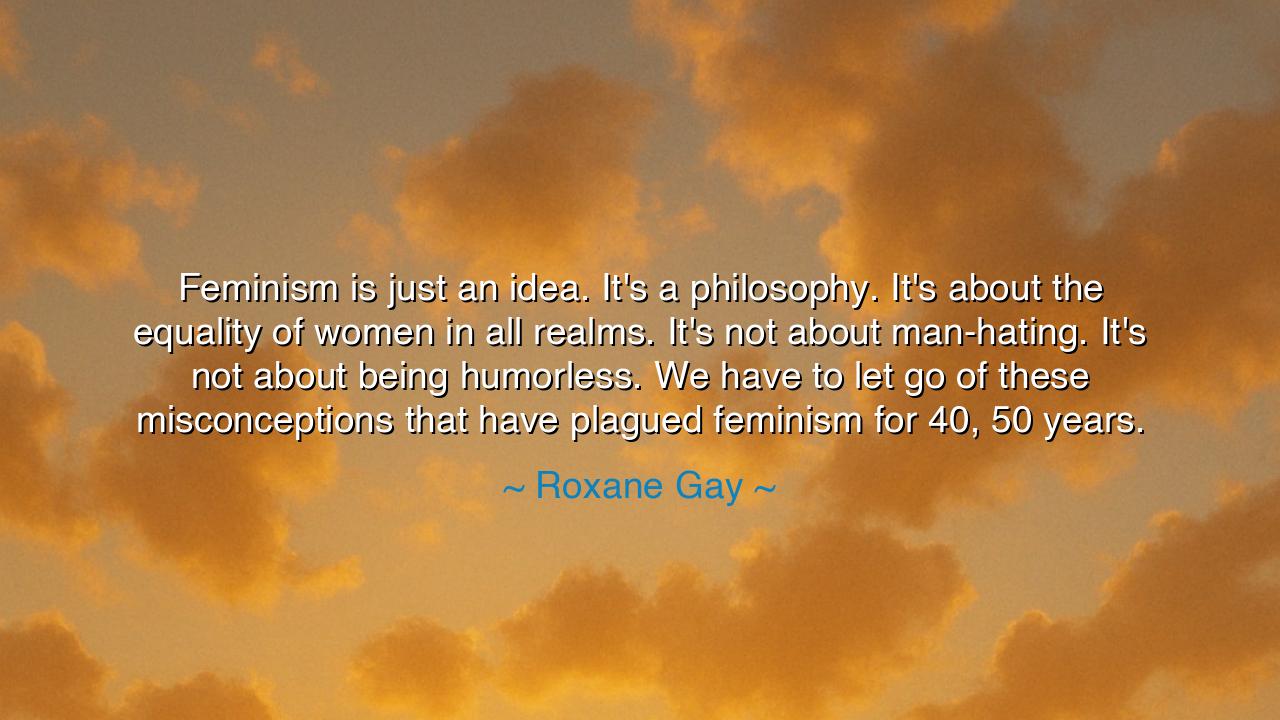
Feminism is just an idea. It's a philosophy. It's about the
Feminism is just an idea. It's a philosophy. It's about the equality of women in all realms. It's not about man-hating. It's not about being humorless. We have to let go of these misconceptions that have plagued feminism for 40, 50 years.






The words of Roxane Gay, “Feminism is just an idea. It's a philosophy. It's about the equality of women in all realms. It's not about man-hating. It's not about being humorless. We have to let go of these misconceptions that have plagued feminism for 40, 50 years,” rise like a breath of clarity through the fog of misunderstanding that has long shrouded the movement for justice. Her voice, at once gentle and fierce, speaks not to divide but to restore — to return feminism to its true and ancient meaning: the belief that all human beings, regardless of gender, are deserving of dignity, freedom, and opportunity. In these words, Gay reclaims the sacred essence of equality, stripped of distortion, and presents it as both philosophy and invitation — a call to understanding, not to war.
To understand the origin of her declaration, one must understand the struggle of feminism itself — a movement born not of anger, but of necessity. For centuries, women across the world labored beneath invisible chains: denied education, silenced in governance, and reduced to symbols rather than seen as souls. When the early feminists of the nineteenth century — figures like Mary Wollstonecraft, Sojourner Truth, and Emmeline Pankhurst — lifted their voices, they were not declaring battle against men, but against injustice. Their aim was simple yet revolutionary: that women be allowed to think, to learn, to work, to lead, and to dream without constraint. Roxane Gay’s words, spoken generations later, remind us that this core has not changed — that feminism, at its heart, is not a weapon, but a mirror reflecting what humanity could be if it lived by its higher virtues.
Yet, as with many noble ideas, the purity of feminism has often been shadowed by misunderstanding. In her lament over “misconceptions that have plagued feminism for 40, 50 years,” Gay names the ghosts that still haunt public thought — the false belief that feminism means hatred, bitterness, or division. These misconceptions are not new; they have followed every reformer since time began. The ancient philosophers who questioned tyranny were once called traitors. The prophets who spoke of compassion were once called heretics. In the same way, those who speak of equality are often branded as destroyers of order. But Gay, like the wise of old, reminds us that philosophy is not destruction — it is creation. It builds new ways of seeing, new bridges of empathy, and new possibilities for peace between the sexes.
Her words echo across history like the quiet wisdom of one who has looked upon both the wounds and the beauty of humanity. In every civilization, progress has come when women’s voices were heard. In ancient Egypt, Hatshepsut ruled with grace and intelligence, proving that power is not the property of gender. In China, Ban Zhao, the scholar of the Han dynasty, wrote that education for women would strengthen families and nations alike. In every age, those who allowed women to flourish found that their societies flourished also. Roxane Gay stands within this lineage — a thinker in the modern world who calls for the same balance the ancients revered: harmony between strength and compassion, between mind and heart, between man and woman.
Her appeal to let go of misconceptions is not a plea for agreement, but for understanding. It is a call to humility — for all people to see beyond labels and listen to the essence of truth. Feminism, as Gay teaches, is not about laughter lost, but laughter restored; not about bitterness, but about healing. It is not the dividing of humanity into camps of man and woman, but the uniting of both into the shared pursuit of justice. Like the philosopher Marcus Aurelius, who wrote that the good of the hive is the good of the bee, Gay reminds us that when women rise, all of humanity rises with them.
There is power, too, in her tone — that calm assurance that feminism is an idea, not an enemy. Ideas are immortal. They cannot be killed by ridicule nor erased by resistance. They move through generations, changing language but never losing their essence. The idea of equality is one such eternal flame, carried by countless hands, burning through centuries of darkness. And though it has been misunderstood, mocked, and misnamed, it endures — because it speaks not to ideology, but to the soul’s innate sense of justice.
Let this be the lesson drawn from Roxane Gay’s wisdom: do not fear the word “feminism,” but seek to understand its heart. Approach it not as a threat, but as a truth — that equality is the natural law of love. Cast aside the armor of defensiveness, and replace it with curiosity, empathy, and courage. For the world will not heal through one gender’s triumph over another, but through both walking hand in hand toward understanding. And when that day comes — when laughter, dignity, and freedom are shared equally — the idea that Gay speaks of will no longer be seen as radical. It will simply be called what it always was: humanity in its rightful balance.






AAdministratorAdministrator
Welcome, honored guests. Please leave a comment, we will respond soon